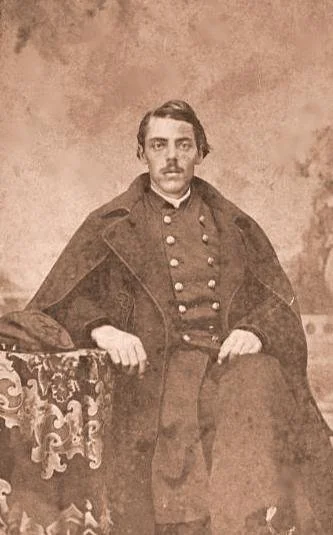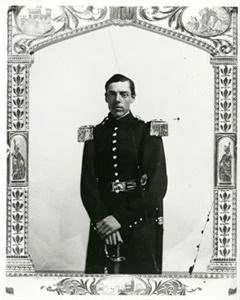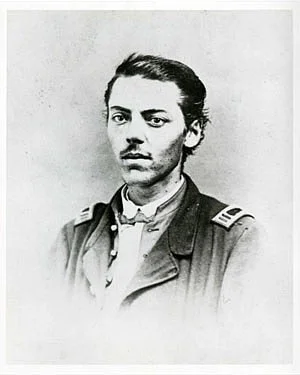Prescription for Success
The Story of Eli Lilly’s Civil War Service in Chattanooga & Inspiring Career
Eli Lilly, the legendary businessman and pharmaceutical tycoon, was also a Colonel who spent part of his Civil War service here during the Battles for Chattanooga. The eldest of 11 children, he recognized his interest in becoming a pharmacist early, earning a certificate of proficiency in 1858, then twenty. He and the company he created, Eli Lilly and Company, were responsible for numerous profound advances in medicinal drug manufacturing, including the invention of gelatin capsules, the development of fruit flavorings, the establishment of a department dedicated to research and the practice of establishing quality-assurance measures. Noted for philanthropy, the foundation established in his honor made a record-breaking $100 million gift in 2024 to the National Park Foundation providing support that came downstream to NPP, making a significant impact to the capacity of National Park Partners to serve our community and grow our National Park.
In 1861, a few months after the start of the American Civil War, Lilly enlisted in the Union Army, first joining the 21st Indiana Infantry Regiment commissioned as a second lieutenant on July 29, 1861. Shortly thereafter the 21st Regiment reached Baltimore, his birthplace, where they remained for several months. Lilly resigned his commission in December 1861 and returned to his home in Indiana to form his own artillery unit.
During early 1862, Lilly had created recruitment posters and was actively recruiting volunteers for his unit among classmates, friends, local merchants, and farmers to create a "crack battery of Indiana.” His unit became the 18th Independent Battery Indiana Light Artillery, known as the “Lilly Battery” with six, three-inch ordinance rifles and 150 men. Lilly was commissioned as a captain and the 18th Indiana mustered into service at Camp Morton in Indianapolis on August 6, 1862, spending a brief time drilling before being sent into battle under Major General William Rosecrans in Kentucky and Tennessee. Lilly's artillery unit was transferred to the Lightning Brigade, a mounted infantry unit under the command of Colonel, later General, John T. Wilder on December 16, 1862.
Lilly was elected to serve as the commanding officer of his battery in August 1862 though his only prior military experience had been in a Lafayette, Indiana, militia unit. He became a competent artillery officer and his battery was instrumental in several battles, including the Battle of Hoover's Gap in June 1863, the Second Battle of Chattanooga in August 1863, the Battle of Chickamauga in September 1863, and the Battle of Mossy Creek in December 1863.
When Lilly's term of enlistment ended in 1864, he resigned his commission, leaving the 18th Indiana to join the 9th Indiana Cavalry (121st Regiment Indiana Volunteers) where he was promoted to major. In September 1864, at the Battle of Sulphur Creek Trestle in Alabama, he was captured by Confederate troops under the command of Major General Nathan B. Forrest, and was held in a prisoner-of-war camp at Enterprise, Mississippi until his release in a prisoner exchange in January 1865.
After his release, Lilly was promoted to colonel on June 4, 1865, and was stationed at Vicksburg, Mississippi, in the spring of 1865 when the Civil War ended. In recognition of his service, he was brevetted to the rank of lieutenant colonel and mustered out of service with the 9th Indiana Cavalry on August 25, 1865.
Lilly remained connected to his military service, using a large atlas to mark the path of his movements during the Civil War and the location of battles and skirmishes in which he participated. He often used the atlas when telling war stories and the colonel's title stayed with him for the rest of his life, his friends and family using it as a nickname for him. In 1893, Lilly served as chairman of the Grand Army of the Republic, a brotherhood of Union Civil War veterans and helped organize a reunion and large parade in Indianapolis that brought together tens of thousands of Union Army veterans, including many from the Lilly Battery.
In 1937, Lilly's son and grandsons established the Lilly Endowment. It became the largest philanthropic endowment in the world in terms of assets and charitable giving in 1998 and remains one of the top ten. At the Chickamauga and Chattanooga National Military Park and Moccasin Bend National Archeological District, The Eli Lilly Foundation’s support continues to make differences every day in the capacity of the NPP team and the breadth of our community engagement and education outreach with students, families, and the community.



